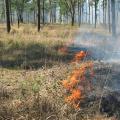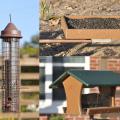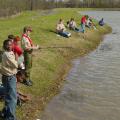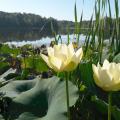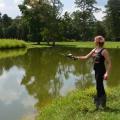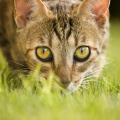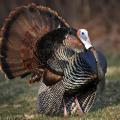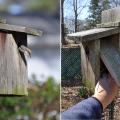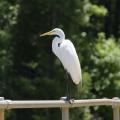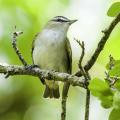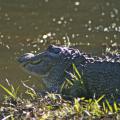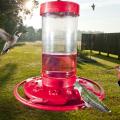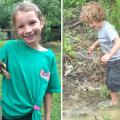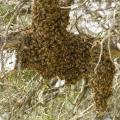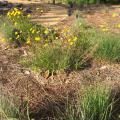Extension Outdoors from 2016
STARKVILLE, Miss. -- It is becoming routine for the nightly news to broadcast video of enormous fires roaring through Western forests, destroying homes and devastating thousands of acres of trees.
By Beth Baker
Research Associate
MSU Department of Wildlife, Fisheries and Aquaculture
STARKVILLE, Miss. -- Litter or trash in streets and roadway ditches is much more than an eyesore, and it continues to be a problem across Mississippi.
STARKVILLE, Miss. -- Nothing elicits wonder and fascination in the minds of deer hunters more than antlers.
Everyone can remember getting a case of the “goose bumps” during an encounter with an antlered buck, and many people remain captivated by antlers throughout their lives. So, why do deer have antlers?
STARKVILLE, Miss. -- You can easily get overwhelmed by the variety of birdfeeders and birdseed blends available online or at your local store.
As with anything, birdfeeders and birdseed can be as simple or as complex as you want them to be. Following the simple tips I offer in this column will ensure an enjoyable and effective bird feeding experience.
STARKVILLE, Miss. -- The decision to fertilize a fishing pond is one that should not be taken lightly.
A fertilization program can greatly increase fish production in fishing ponds. Adding nutrients stimulates the growth of microscopic plants, or algae, which feed the small animals that feed the fish.
By James E. “Jim” Miller
Professor Emeritus, Department of Wildlife, Fisheries and Aquaculture
MSU Extension Service
STARKVILLE, Miss. -- As I have gotten older, I’ve noticed changes in my neck and spine have led me to walk more bent over. I’m not the only one; many biologists and naturalists I know walk the same way. Our eyes seem to scan the ground directly in front of us more deliberately than when we were younger.
STARKVILLE, Miss. -- Having too many weeds in a pond is the bane of many Mississippi pond owners.
Pond weeds start growing early, as soon as day length and water temperatures allow. Don’t let them get out of hand! Start a weed management program before they become a problem to keep your pond picture perfect.
STARKVILLE, Miss. -- One of the most common questions I get is, “How do I manage the fish in my lake or pond?”
My responses to these landowners vary, but I usually ask them some questions of my own. What is your goal? Do you want big bass, big bream or just an overall increase in all fish species in your pond or lake? Once the lake owners set their goals, then we can go to work.
STARKVILLE, Miss. -- Over the years, a number of felines have lowered their standards enough to share their lives with me, and my life was richer for the experience. I wouldn’t call myself a “cat lady,” but I am definitely a cat fan.
Before you dog lovers start hating me, you should know that even more dogs have been part of my family, along with rabbits, horses, goats, snakes, hamsters and assorted poultry.
STARKVILLE, Miss. -- As the movement toward buying local food continues to grow, consumers may wonder if this trend is actually benefiting the environment.
A 2011 U.S. Grocery Shopper Trends Survey reported that consumers were motivated to buy local food for a variety of reasons, including freshness, taste, support of the local economy, knowledge of food sources and concern for the environment.
STARKVILLE, Miss. -- With spring comes turkey season and the countless hours spent listening for that chill-inducing gobble.
RAYMOND, Miss. -- One of the key elements of creating a wildlife-friendly yard is providing areas for animals to nest.
By Evan O’Donnell
MSU Extension Service
STARKVILLE, Miss. -- Mississippians are blessed with some amazing public lands across the state that offer opportunities for families, organized groups and individuals to experience the beauty of the state and its many outdoor recreational activities.
RAYMOND, Miss. -- Spring is a favorite time year for many people who enjoy watching the outdoors come alive with fields of flowers, groves of small budding trees, mixed forests exploding with new growth and the heavens filled with singing birds.
STARKVILLE, Miss. -- Pond and lake owners frequently seek help to control unwanted pests in and around their water, such as turtles, beavers, muskrats, nutrias, alligators and sometime geese.
A new lake or pond provides a new habitat for local critters to move into and live. When landowners decide to put a pond or lake on their property, they need to consider control plans for those unwanted visitors because it is only a matter of time until these animals move in and call the body of water home.
RAYMOND, Miss. -- The sight of a hummingbird darting from flower to flower announces spring’s arrival and offers hours of entertainment all summer long.
Many of us provide hummingbird feeders to increase the numbers of the tiny birds we see around our homes before they migrate back to their winter homes in Mexico and Central America.
STARKVILLE, Miss. -- With the busy schedules many of us keep, it is hard to make time to spend outdoors with our kids, but this is a vital part of their development.
A news article recently caught my eye with a report I found appalling. On average, prisoners spend more time outside than our youth do. To me, this is incredibly sad. Most of our schools are not doing much to help young explorers thrive.
Our children spend over 90 percent of their time indoors and more than 50 hours a week on electronic devices. Society needs to wake up before it is too late.
RAYMOND, Miss -- This time of year is when swarms of honeybees settle in trees or shrubs as they leave their hives searching for larger places to live
STARKVILLE, Miss. -- Despite above-average rainfall in Mississippi between January and March, only a small portion of that moisture made it back into our groundwater, which is the primary source for household needs, including water for lawns and gardens.
STARKVILLE, Miss – Many of us look forward to a summer garden every year, especially after a long winter.
Unfortunately, many wildlife species find garden vegetables and plants just as delicious as we do. This leads to a battle -- a battle to keep the fruits of our labors to ourselves rather than providing a meal for the local wildlife.

